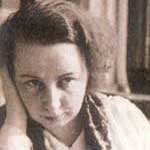
Irmgard Keun (February 6, 1905 - May 5, 1982) was a German author noteworthy both for her portrayals of life in the Weimar Republic as well as the early years of the Nazi Germany era.
 Biography
BiographyIrmgard Keun was born in Berlin (Charlottenburg) to Eduard and Elsa Charlotte Keun on February 6, 1905. She and her family, including her brother Gerd, born in 1910, lived in the city until 1913, when they moved to Cologne. There Keun attended an evangelical girls' school, from which she graduated in 1921. She worked as a stenotypist, but also attended acting school in Cologne from 1925-1927. Although she then landed stage roles in Greifswald and Hamburg, these were only somewhat successful, and she decided to abandon her acting career in 1929. Encouraged by German writer Alfred Döblin, she turned her hand to writing.
In 1932, she married the writer and director Johannes Tralow. They divorced in 1937.
Keun's first novel, Gilgi - One of Us, made her famous, as well as her next book and best-seller, The Artificial Silk Girl.
In 1933/34, her books were confiscated and forbidden by the Nazis. She went into exile from 1936-1940, first to Ostend in Belgium and later to Holland.
Keun received great acclaim for her sharp-witted books, most notably from such well-known authors as Alfred Döblin and Kurt Tucholsky, who said about her, "A woman writer with humor, check this out!". She counted among her friends such literary notables as Egon Erwin Kisch, Hermann Kesten, Stefan Zweig, Ernst Toller, Ernst Weiss, and Heinrich Mann. From 1936 to 1938, she had a romantic relationship with Joseph Roth, a relationship that at first had a positive effect on her literary output. She worked together with Roth, traveling with him to various cities such as Paris, Wilna, Lemberg, Warsaw, Vienna, Salzburg, Brussels and Amsterdam. After the German invasion of the Netherlands, she returned in 1940 to Nazi Germany. Protected by false reports of her own suicide, she lived there undercover until 1945.